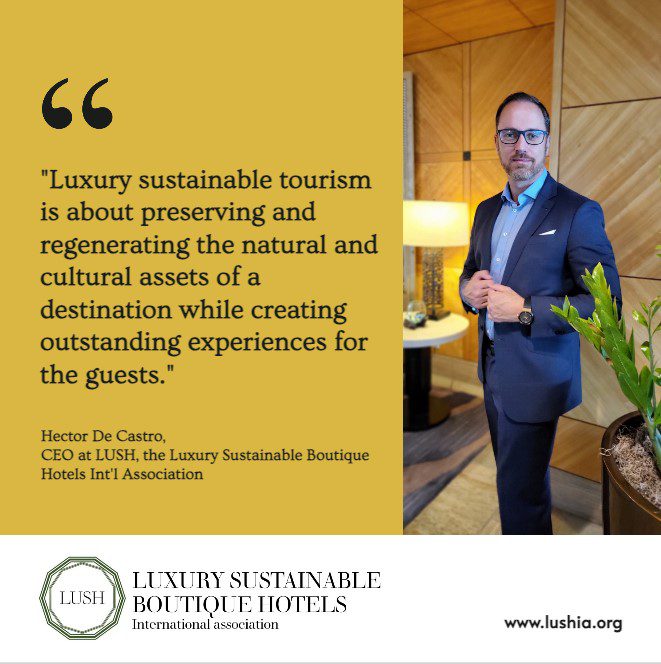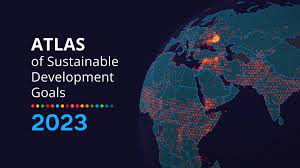As we enter the third decade of the 21st century, achieving sustainable development has become an urgent global priority. Recently, the World Bank, unveiled the highly anticipated “2023 Atlas of Sustainable Development Goals”. From LUSH, the Luxury Sustainable Boutique Hotels Int’l Association, we keep on supporting these measures and values. The present article will delve into the key insights from the Atlas, highlighting the strengh of collective effort, market data, and statistics that shed light on the state of sustainable development.
Mapping Progress
The 2023 Atlas of Sustainable Development Goals serves as a comprehensive resource that offers a global perspective on the progress made towards achieving the 17 Sustainable Development Goals (SDGs) set forth by the United Nations. These goals encompass critical areas such as poverty eradication, clean energy, gender equality, climate action, and responsible consumption and production. The Atlas provides a detailed analysis of key indicators, showcasing both success stories and areas that require intensified efforts.
Collaborative Efforts. LUSH
The Luxury Sustainable Boutique Hotels International Association (LUSH) plays a pivotal role in advancing sustainable development initiatives within the luxury boutique hotel and wellness sector. As supporter of the World Bank, LUSH actively promotes sustainable practices and responsible tourism. Their commitment to environmental stewardship, social responsibility, and community engagement aligns with the SDGs and contributes to the overall sustainability agenda. Through their allignement, LUSH empowers the luxury boutique hotel industry to drive positive change in sustainable development.

Market Data and Statistics
The 2023 Atlas of Sustainable Development Goals underscores the economic and market dimensions of sustainability. Market research reveals a significant rise in the demand for sustainable products and services. According to projections by Grand View Research, the global sustainable products market is expected to reach a value of USD 378.2 billion by 2025, with a compound annual growth rate (CAGR) of 8.9%. This surge in demand reflects a fundamental shift in consumer preferences towards environmentally friendly and socially responsible choices.
In the luxury hospitality sector, sustainable hotels have gained prominence due to growing awareness and increasing demand from environmentally conscious travelers. A survey conducted by LUSH indicates that 78% of luxury hotel guests consider sustainability as a key factor when selecting accommodations. Moreover, a report by the Global Wellness Institute highlights the steady growth of the wellness tourism market, with wellness trips accounting for 17% of all tourism expenditures.
Conclusion

The Sustainable Development Goals (SDGs), initiated by the United Nations in 2015, provide a universal framework for fostering peace and prosperity for both humanity and the planet, with a target completion date of 2030. These goals aim to tackle a wide range of pressing global challenges, including eradicating poverty, eliminating hunger, ensuring inclusive education, promoting gender equality, and addressing the urgent issue of climate change.
The release of the 2023 Atlas of Sustainable Development Goals marks a significant milestone in our collective journey towards a sustainable future. With the collaborative support of organizations like LUSH, hopitality industry reinforces the importance of collavorative action and engagement in achieving the SDGs. Market data and statistics confirm the rising demand for sustainable products and services, signifying a shift in consumer behavior towards responsible consumption and eco-conscious practices.
The future
Looking to the future, it is evident that achieving the SDGs requires unwavering commitment and collaboration across sectors. Governments, businesses, civil society organizations, and individuals must continue to work hand in hand to address the pressing challenges of poverty, hunger, education, gender equality, and climate change.
While progress has been made, significant challenges lie ahead. The current state of the world underscores the need for accelerated action and innovative solutions. We must embrace renewable energy, foster sustainable consumption and production patterns, invest in education and skill development, empower women and marginalized communities, and strengthen global partnerships.
The vision of a sustainable future is not unattainable. By leveraging technology, mobilizing financial resources, and promoting inclusive and equitable policies, we can create a world where no one is left behind. Together, we can ensure a future that thrives economically, socially, and environmentally.
By leveraging the knowledge and insights provided by the Atlas, we can collaboratively work towards a more sustainable and inclusive world. Governments, businesses, civil society, and individuals must join forces to ensure economic growth is aligned with environmental stewardship and social progress.
References:
- World Bank: https://www.worldbank.org/
- LUSH, the Luxury Sustainable Hotels and Wellness Int. Association: https://lushhotels.org



